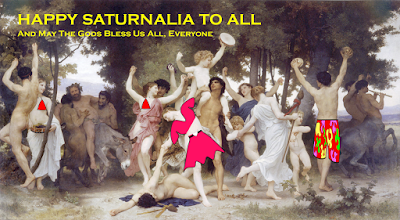 |
| Yes, I edited it. Didn't really want nudity in my thumbnail. Besides, everyone loves beach shorts! (Even Romans?) |
I will take this moment to note that while some of this is based on fact, other parts are completely my own interpretations of things that I’ve read. I will also note that this is by no means making a mockery of or attempting to “debunk” religion of any kind – merely some musings about history.
When did “Christmas” begin?
Christmas did not actually exist during the first several centuries of Christianity. So when exactly did people start celebrating December 25th as the birth of Christ?“Christmas” as we now know it was first declared a holiday around 300 AD, shortly after Emperor Constantine (Rome’s first Christian Emperor) declared Christianity as the official religion of Rome. So, an empire that was recently non-Christian converted to Christianity and later announced that Christmas would be celebrated on December 25th.
It may be fair to mention that a different calendar was used in those days, but the difference between the “Julian” calendar which was used then and the “Gregorian” calendar which we use now is fairly insignificant – about 49 minutes per year.
The Birth of the Sun and the Birth of the Son (of God?)
Prior to Rome being declared Christian and Christmas being declared a holiday, December was already a festive month for the Romans. During the 3rd week of December, from the 17th till the 23rd, Roman’s celebrated Saturnalia with feasting, partying and gift-giving. Saturnalia was held in honor of the god Saturn and of the Winter Solstice.
The Winter Solstice marks the day of the year with the fewest hours of daylight and the longest night, signifying the middle of winter. Following the Winter Solstice, the days begin to lengthen again. This was celebrated as “Dies Natalis Solis Invicti,” or “Birth of the Unconquered Sun.”
 |
| A Sol Invictus Temple. Interesting how Jesus also comes with those lights around his head? Image source. |
Bonus Information about the Gregorian Calendar, in case anyone is interested.
How often does a leap year occur? If you said every 4 years, you'd be wrong. (who knew? I just found this out today.)
According to the Julian Calendar, implemented by Julius Caesar, the leap year took place once every four years, effectively making each year 365.25 days long. However, due to a slight discrepancy with the solar calendar, this was later replaced by the Gregorian Calendar which we now use today. The Gregorian Calendar is approximately 10 minutes shorter than the Julian Calendar.
In case you are curious about the Gregorian leap years, they occur in any non-century year that is divisible by four. For centurial years, they will only be a leap year if they are also divisible by 400. Meaning the years 1600 and 2000 would be leap years, whereas 1700, 1800, and 1900 would not.
Therefore, in 400 years, we wouldn't have 100 leap years, but only 97.
1 Gregorian year is 365.2425 days long.


0 comments:
Post a Comment